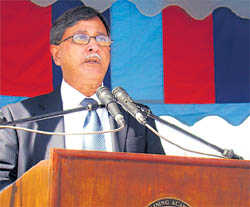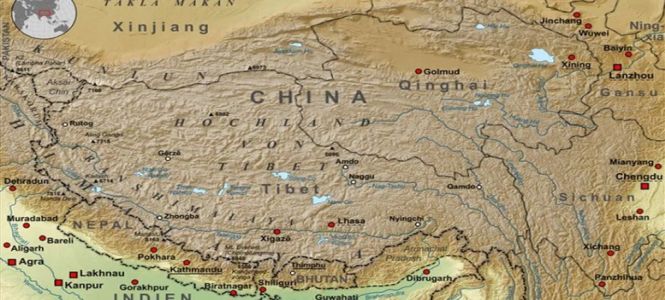Current Events :










The Assam Rifles on Wednesday formally inducted its first batch of 100 women soldiers at a ceremony in Nagaland, reported The Telegraph. Union Minister of State for Home Kiren Rijiju was present at the ceremony, which was organised to induct 212 new recruits.
The women will be attached to various units of the 181-year-old paramilitary force.
The Assam Rifles plan to use the women officers for search operations, frisking and interrogating female accused, and dealing with women protestors during agitations, said Lt Col Rahul Josan, the force’s public relations officer.
“Relief and rescue operations during communal tension and natural calamities, dealing with women protesters to avoid violation of human rights and projecting a clean image of the force would be the other important tasks of the women personnel,” he said.


WhatsApp is rolling out end-to-end encryption, a move that will potentially protect texts and voice calls of its over one billion users from hackers and “regimes”. “WhatsApp has always prioritised making your data and communication as secure as possible. And today, we’re proud to announce that we’ve completed a technological development that makes WhatsApp a leader in protecting your private communication,” founder Jan Koum said. The latest version of the app will encrypt every call, message, photo, video, file and voice message that is sent on the platform by default, including group chats. “No one can see inside that message. Not cybercriminals. Not hackers. Not oppressive regimes. Not even us,” he said. PTI

In his inaugural statement at a seminar on nuclear security at a think tank in Islamabad, the Nuclear Development Adviser to Pakistan’s National Command Authority, General Khalid Kidwai (retd), made sure to get the deterrence message across to India. He warned that, “Cold Start or no Cold Start”, Pakistan’s adoption of “full spectrum deterrence” had brought about “retention of strategic equilibrium in South Asia” by seriously neutralising any propensity in India for the “use of the military as an instrument of policy”. For their contribution to “peace and stability in the region”, he was inclined to echo the title of a book on India’s nuclear weapons by Raj Chengappa, calling Pakistan’s nuclear weapons, “weapons of peace”. On return from Islamabad, where Sushma Swaraj had gone for the ministerial meeting of the Heart of Asia conference on Afghanistan, briefing Parliament she acknowledged as much, saying: “war is not an option”. Whereas she did not specify why this was so, the nuclear factor also figures among other reasons to avoid war, such as the economic one. Since both states are close to embarking on a “bilateral comprehensive dialogue” brokered by Swaraj during her Pakistan visit last December, it would appear that Khalid Kidwai is at least partially right. However, since the promised dialogue has not taken off three months on since its announcement indicates the pitfalls. The terror attack on Pathankot airfield early in the year resulted in the foreign secretary talks scheduled for mid-January being postponed. Even if talks finally take off in wake of the visit of the joint investigation team from Pakistan to the site of the terror attack in Pathankot, the hiatus indicates a continuing fragility that cannot be wished away. This is compounded by India’s Pakistan strategy, likened by a former Indian ambassador to that country as “manic pirouetting”. Since the strategy is controlled by National Security Adviser, Ajit Doval, his views are worth probing.Immediately prior to parliamentary elections, in which Doval had a major hand in generating the Modi wave, Doval laid out his strategic world view at a talk in Sastra University. He called for a shift from a defensive strategy to one of “defensive offence”. Since this was not an offensive strategy, the nuclear threshold was not of consequence. He preferred “Intelligence-led”, “covert”, operations to military action against Pakistan’s “vulnerable” areas, such as its “internal security”. Deeming “strategy without tactics is noise before defeat”, it can be expected that Doval as NSA is practising what he preached. Pakistan’s recent nabbing of an alleged Indian spy, former naval officer Kulbhushan Jadhav, is perhaps evidence of this. Alongside, in another preview of his Pakistan strategy, Doval as head of the Vivekananda International Foundation had instigated a press statement by 41 members of the strategic community. The statement had effectively tied down UPA II from contemplating a resumption of talks with Pakistan. It called for terrorism as being the sole agenda of talks. Today the promised “comprehensive bilateral dialogue” continues in abeyance, held hostage to terrorism. This explains Sushma Swaraj’s briefing to Parliament: “We have decided that through talks we will resolve the issue of terrorism as talks is the way forward so that the shadow of terror is removed.” The upshot is that India’s Pakistan strategy appears to have two prongs. One is to condition Pakistan to its underside by exposing it to Indian intelligence operations, while engaging in a dialogue restricted to terrorism.The strategy is not without its dangers. Firstly, while Indian interests are sought if not quite met this way, over time Pakistan’s national security estabishment’s interest in the dialogue would lag. It is currently not averse to Sharif’s outreach to India that relies on personal equations reinforced with Indian Prime Minister Narendra Modi’s brief stop over at Sharif’s Raiwind residence. However, a status quo in India’s favour could prompt counter action by the Pakistan army to once again use its tried and trusted instrument, the ISI. Secondly, the Pathankot terror attack and Pakistani NSA’s tip off to his Indian counterpart of infiltration of ten terrorists on Mahashivratri eve into India suggests that terrorist forces can act autonomously. They can trigger off another crisis by a mega terror attack. During his Sastra University address, Doval had weighed in favour of an intelligence-driven response to 26/11. In effect, the intelligence game would now heat up, increasing propensity for either side eventually going military. It is then that the nuclear threshold, so cavalierly dismissed by both Doval and Khalid Kidwai, would kick in. Given such escalatory possibilities, the contrasting policies of the two states appear delusional. Whereas Pakistan loses no opportunity to foreground nuclear dangers to reinforce deterrence, as done most recently by Kidwai, India for its part has taken care to omit any mention of nuclear weapons in relation to military exercises since 2013. Foregrounding nuclear dangers thus continues to be important, if only to compel the two states to remain at the table. Ali Ahmed is the author of ‘India’s Doctrine Puzzle: Limiting War in South Asia.’
Amritsar, March 27
An Army official is being interrogated in connection with his wife’s murder and has undergone the lie-detector test. Lt Col Santosh M Badhkharke, posted with 65 Field Regiment here, underwent a polygraph test on March 18, inspector SS Randhawa, who is probing the case, said today.Badhkharke’s wife Vanita was found dead under mysterious circumstances in their residence in the cantonment area on March 14, 2012, he said.Randhawa had accompanied Badhkharke to the Central Forensic Science Laboratory, New Delhi, where the lie-detector test was conducted.He said DCP Kaustub Sharma had recommended the polygraph test after Vanita’s parents approached police, suspecting the army official’s role in her murder.Citing their complaint, Randhawa said the entry of outsiders was restricted in the cantonment area and Vanita was found murdered a day after Badhkharke had gone out for work. — PTI
ail travel for senior citizens will become easier from April 1 as the quota for the elderly has been increased by 50%. The quota can also be availed by 45+ women travelling alone and pregnant women. The decision on the enhancement of the quota is in continuation of railways minister Suresh Prabhu’s budgetary announcement this year.

Majid Jahangir
Tribune News Service
Srinagar, March 15
The Jaish-e-Mohammad’s Pakistani militant who was arrested in Baramulla last month had not only managed to acquire a fake Aadhaar card during his nearly three month hiding in Kashmir but had also stayed at the J&K Police facility for three days.The 18-year-old Mohammad Sidiq Gujjar, alias Shahid, a resident of Sialkot in Pakistan, was arrested during an operation on the intervening night of February 24 and 25 on the outskirts of Baramulla. He was part of the Jaish’s four-member fidayeen squad which carried out an attack on an Army installation in Tangdhar, Kupwara, in November last year.“The fake Aadhar card of Indian nationality for Gujjar was prepared in the frontier district of Kupwara by a computer operator,” said a senior police officer.The Pakistani militant is believed to have told his interrogators that he was trying to revive the group in Kashmir, whose cadre strength has reduced to less than 10.Born in 1998 at Galotia Kalan in Sialkot, Gujjar was motivated by a friend, Abdul Razzaq, to join the Jaish outfit after passing Class IX, the police said.“Gujjar being a minor got easily motivated for jihad to seek Jannat thereafter. He later joined the Balakote training camp (Syed Shah Ismail Shaheed Madrassa ) wherein he started receiving training in two phases,” said a police report accessed by The Tribune. “The training was imparted by a senior militant of Jaish, Gori Fazal Shah. Besides arms and ammunition, he had specialised training in handling GPS devices, wireless communication devices and map reading. After completing the training, he was allowed to meet his 10-member family at Galotia Kalan for two or three days.”“He was then send to a launching pad at Kundal Shahi in PoK from where he along with his three associates Hussain, Mavia and Rizwan during the intervening night of November 24 and 25, 2015, infiltrated into India and reached Tangdhar Army Camp in the wee hours of November 25, and attacked battalion headquarters of the 3/1 Gorkha Rifles unit in which a civilian was murdered,” the report added. A police officer said Gujjar being the youngest of the attackers was asked by the other members of the group to flee after attacking the army base.“His three associates before getting killed instructed Gujjar to launch another massive attack in the Kashmir valley and establish the Jaish base for furtherance of terrorist activities in the Kashmir valley,” the report said.“The Jaish fidayeen managed to escape from the spot and stayed in forests of Kupwara for two months in the hunt for susceptible youths for recruitment to carry out further attacks in the Valley,” it said. “Gujjar met with a person who owns a computer shop at Kupwara market, who helped him get an election card and an Aadhar card, which helped him roam freely in Kashmir.”The report said the computer shop owner (who was detained by the police for questioning) also helped him get in touch with a person who resides in Kupwara town in getting contacts at Baramulla and also accompanied him on February 6 to the house of a Baramulla resident, who is “already a notorious person and has been involved in various stone-throwing incidents and anti-national activities.” Gujjar got in touch with other youth too in Baramulla.“The whole group, which now consists of the subject (Gujjar), Farhan, Ahsan, Rashid lived in the fear that the news about the presence of subject in the Baramlulla area might be leaked out. They managed to take one Suhail Ganie in confidence whose father is working in the police as a follower at STC (Subsidiary Training Centre), Sheeri, and the subject stayed there from February 18 till February 21, 2016,” the report said, adding that Gujjar also imparted training to local youth near Baramulla.All five associates of Gujjar in Baramulla were arrested by the police.

























































